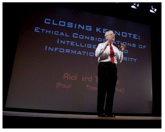
Presentation Title Conspiracy Theories, Counter-Intelligence, and Knowing the Players without a Program
Presentation Abstract
Calling a person a “conspiracy theorist” is an easy way to dismiss what used to be called “an investigative journalist” as if they are fringe, wacko, loopy or insane. But the deeper we go into the sources of “frame management” by oligarchic networks, meta-national-structures of political and economic power, patterns of activity behind some assassinations, covert operations since 1947, and the intentional destruction of some careers, the more we venture into the darkness which comes to permeate our understanding, saturate our perspective with canny insight, and erode childlike faith and naiveté.
This talk suggests ways of exploring some interesting topics and discusses why it takes what it takes to begin to have a clue, that is, a clue about the reality of our media-centric lives. Thieme returns to his roots, in a way, when he said in a keynote for Def Con 4 many years ago (for 300 attendees!) that hacking was practice for life in the twenty-first century. It is, and that century is well under way, and the methodologies of hacking are indeed essential for having a clue. So reverse engineering applies not only to physical structures but to cognitive and virtual artifacts as well. Paranoia is appropriate, things are much worse than they seem, and while we can never win at the end, we can have fun playing the game of life as contrarians and insight specialists.
As Jane Wagner said, “I am getting more and more cynical all the time and I still can’t keep up.”
About Richard Thieme
Richard Thieme has published hundreds of articles, dozens of short stories, two books with more coming, and given several thousand speeches. He speaks professionally about the challenges posed by new technologies and the future, how to redesign ourselves to meet these challenges, and creativity in response to radical change. Many recent speeches have addressed security and intelligence issues for professionals around the world. He has keynoted conferences in Sydney and Brisbane, Wellington and Auckland, Dublin and Berlin, Amsterdam and and Heidelberg, Johannesburg, Montreal, Tel Aviv, and all around the USA.
Clients range from GE, Microsoft and Medtronic to the Pentagon, the FBI, and the US Secret Service. His pre-blog column, “Islands in the Clickstream,” was distributed to thousands of subscribers in sixty countries before collection as a book by Syngress, a division of Elsevier. “Mind Games,” his first fiction collection, was published by Duncan Long Publications in April 2010. His work has been taught at universities in Europe, Australia, Canada, and the United States.